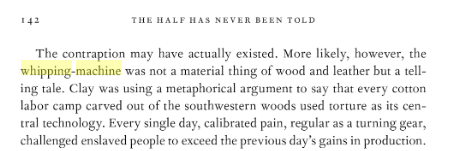Along with the term “pushing system” that Baptist invented
and attributed to slaves and his fictional estimate of the economic impact of
slave produced cotton, the “whipping machine” has been one of the most frequently
cited stories from The Half Has Never Been Told. Foner, for instance, explained
in his New
York Times review “Each slave was assigned a daily picking quota, which
increased steadily over time. Baptist, who feels that historians too often
employ circumlocutions that obscure the horrors of slavery, prefers to call it
“the ‘whipping-machine’ system.” I saw it mentioned again recently and decided to look at the actual slave narrative that Baptist refers to. By this time I should not have been surprised at what I found. Nevertheless, I was.
Here is Baptist’s description
Henry Clay seems to be an almost perfect representative for
Baptist’s claims about slaves being moved to the cotton frontier of the Southwest,
where owners invented new ways to drive them harder.
Henry Clay’s slave narrative is in WPA
Oklahoma Slave Narratives. Here are the parts relevant to Baptist’s
interpretation.
In both versions Clay is born in North Carolina and then
sold and moved to Louisiana, and both include Clay’s description of a whipping
machine. But the whipping machine did not drive him to pick cotton faster in Louisiana
because it was not in Louisiana and he did not pick cotton in Louisiana. In
Clay’s narrative, the whipping machine was owned by his original master in
North Carolina, and Clay claims that he did not use it. According to Clay threats
were common on the North Carolina plantation but whipping was not. When his new
master took him to Louisiana he first cleared land and then was rented to a ship
captain. Eventually, he was taken to Oklahoma when he was inherited by the son
of the man that took him to Louisiana. Did the whipping machine actually exist? Baptist suggests not. He thinks Clay was using it as a metaphorical argument that "every cotton labor camp cleared out of the southwestern woods used torture as its central technology." Well, I don't think he was doing that since he placed it in North Carolina. Moreover, I don't see anything in the narrative suggesting that he was interested in making metaphorical arguments. If I had to choose between real and metaphorical I would probably go with real. The description is very specific and it is plausible. It sounds like a large spinning wheel with straps attached to the wheel. I have no guess as to whether it would have been functional or used. In the absence of corroborating evidence it is difficult to assess. The lack of corroborating evidence suggests that if it existed it was rare, if not unique.
The bottom line is that Henry Clay's story about the whipping machine is not the one that Baptist tells. One has to wonder at his point if there anything in the book that is faithful to the
sources that it is supposedly based on? The case of the whipping machine reinforces the fact that criticism of Baptist has nothing to do with different methods of historians and economists; it has everything to do with Baptist's failure to meet the standards by which historians have traditionally evaluated each others work.





